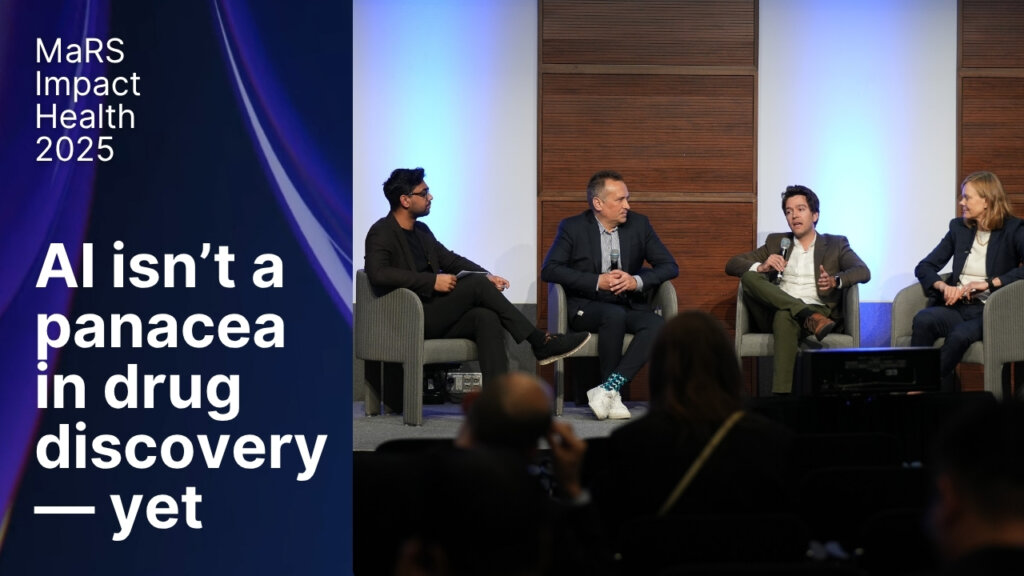Home » AI Isn’t a Cure-All for Drug Discovery—At Least Not Yet
AI Isn’t a Cure-All for Drug Discovery—At Least Not Yet

At MaRS Impact Health 2025, industry leaders discussed the evolving landscape of AI life science startups, particularly their shift towards developing proprietary drug programs. This pivot reflects a broader trend within the industry, as startups harness artificial intelligence to enhance drug discovery and development processes.
Alexander Mosa, Chair and Chief Scientific Officer at Biossil, highlighted the increasing integration of AI in drug development. He emphasized that AI can significantly reduce the time and costs associated with bringing new drugs to market. By leveraging machine learning algorithms, companies can analyze vast datasets to identify potential drug compounds and predict their efficacy more rapidly than traditional methods.
Janet Bannister, Managing Partner at Staircase Ventures, noted the changing dynamics of venture capital investment in the life sciences sector. Investors are increasingly interested in startups that use AI not only for drug discovery but also for personalized medicine. Bannister pointed out that the ability of AI to tailor treatments to individual patients could revolutionize care, thus attracting funding and collaboration from major pharmaceutical companies.
Anthony de Fazekas, a Partner at Mintz LLP, emphasized the importance of regulatory considerations as startups navigate the transition to drug development. He discussed how startups must not only innovate technologically but also understand and comply with regulatory frameworks that govern drug approval processes. This compliance will be vital to securing the trust of investors and regulatory bodies alike.
Mobeen Lalani, Manager of Technology and Venture Development at Toronto Innovation Acceleration Partners (TIAP), shared insights on the role of innovation hubs in fostering collaboration among startups, academic institutions, and established pharmaceutical companies. Lalani underscored that these partnerships are crucial, as they enable startups to access resources, expertise, and funding necessary to advance their drug development programs.
The discussions highlighted the key challenges and opportunities that AI life science startups face in the current landscape. With the potential to streamline drug discovery processes and improve patient outcomes, these startups are well-positioned to lead innovations in healthcare. However, the path to successful drug development is fraught with challenges, including navigating complex regulatory environments, securing adequate funding, and competing with established players in the pharmaceutical industry.
As AI continues to transform the life sciences sector, the collaboration between startups and established entities will play a crucial role in driving advancements. This collaborative approach can help mitigate risks and accelerate the development of new therapeutics. The industry experts underscored the necessity for agility and a forward-thinking mindset among startups to adapt to changing market demands and technological advancements.
In summary, the shift of AI life science startups towards developing their own drug programs marks a significant evolution in the industry. By leveraging AI to enhance drug discovery, these companies aim to improve efficiency and patient outcomes. As they navigate regulatory challenges and strive for funding, innovation hubs and partnerships with established pharmaceutical firms will be critical in shaping the future landscape of drug development. The insights shared at MaRS Impact Health 2025 underscore the importance of this transformation for the healthcare industry, signaling a new era of possibilities in medical science driven by artificial intelligence.
MaRS Discovery District
https://www.marsdd.com/
MaRS is the world's largest urban innovation hub in Toronto that supports startups in the health, cleantech, fintech, and enterprise sectors. When MaRS opened in 2005 this concept of urban innovation was an untested theory. Today, it’s reshaping cities around the world. MaRS has been at the forefront of a wave of change that extends from Melbourne to Amsterdam and runs through San Francisco, London, Medellín, Los Angeles, Paris and New York. These global cities are now striving to create what we have in Toronto: a dense innovation district that co-locates universities, startups, corporates and investors. In this increasingly competitive landscape, scale matters more than ever – the best talent is attracted to the brightest innovation hotspots.


